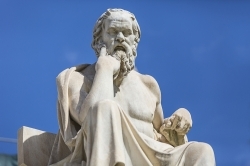Theism is the philosophical concept that defend the existence of gods, that is, superior divine entities that would have been responsible for the creation of the Universe and all the things that exist in it.
Theism supports the idea of the existence of one (monotheism) or several gods (polytheism), so it is not considered a type of religion. This concept is limited to classifying only what is related to the existence of gods. Theology, for example, is a discipline that is born and based on the concept of theism.
Theism can be divided into: monotheism (belief in one God); polytheism (belief in various gods); and henotheism (belief in several gods, one being supreme to all). In this way, theists are formed both by Christians (monotheists), as they believe in only one God; and by Hindus (polytheists), who believe in various gods.
The word theism originated from the Greek theos, which literally means "god". Thus, the concept of theism is directly opposite to that of atheism, who does not believe in the existence of any kind of deity.
know more about Atheist and Atheism.
Theistic philosophy began to be propagated from the 17th century onwards, through the English philosopher and theologian Ralph Cudworth (1617 - 1688). Its emergence came to oppose the atheist, deist and pantheistic movements.
The main characteristic of theism is the strengthening of the idea of the existence of a single God, omnipresent, omniscient and omnipotent, and that transcends all existing things in the Universe.
open theism
It consists of a theological practice where some of the main characteristics of God are removed: omnipresence, omnipotence and omniscience. This current is also known as "opening theology" or "opening of God".
arising from the call Process Theology, followers of open theism claim that the creator deity (God) does not have the ability to know the future. In this way, it allows you to constantly change your mind about your actions, as events unfold.
Thus, for open theism, God is able to know everything that is possible to be known, however, as it is impossible to know what is yet to come, the supreme divinity would not be at all omniscient.
To justify open theism, its advocates use passages from the Holy Scriptures to show how God shows surprise in some situations, as well as changing his mind and acquiring knowledge from the experience (Genesis 6:6; 22:12; Exodus 32:14; Jonah 3:10).
Theism and Deism
Like theism, deism believes that the universe was created by a being of superior intelligence. However, both differ in that deism believes that this entity may or may not be god.
Unlike the foundations of theism, which consists of tradition and direct disclosure of information from ancestors, deism is based on reason, free thought and personal experiences.
Thus, the conception of God is not only in the fact that this was revealed through ancient traditions, but through the rational understanding of the idea of Divinity. For this reason, deists cannot be considered atheists, as they believe in the existence of a deity. However, unlike theism, deism sees no need to institutionalize religions or other types of formal cults.
For the deists, the creator deity tried to give nature the responsibility to control the course of life and all things. In this way, from the moment of creation, the Creator ceases to exercise its position as a divinity, thus dispensing with the need for cults and adoration for it.
Deist theories were elaborated in the 17th century by Lord Herbert Cherbury, the creator of British deism.
Learn more about Theology and religious diversity.


